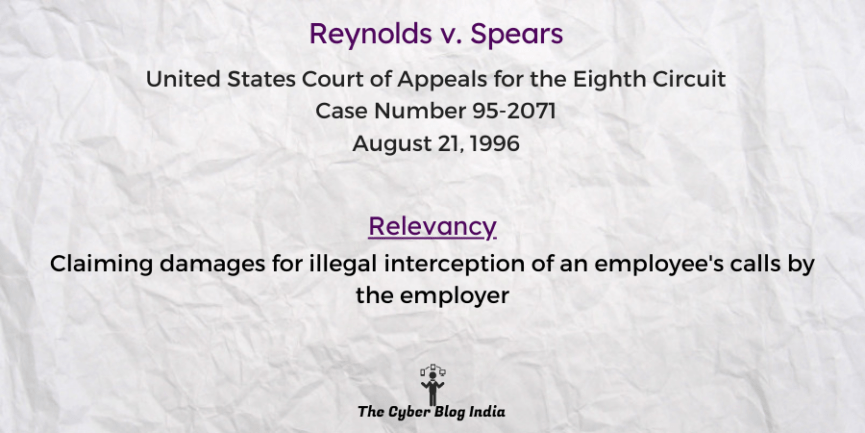Reynolds v. Spears

Reynolds v. Spears
83 F.3d 428 : 65 USLW 2156
In the United States Court of Appeals for the Eighth Circuit
Case Number 95-2071
Before Circuit Judge Bowman, Circuit Judge Heaney, and Circuit Judge Arnold
Decided on August 21, 1996
Relevancy of the Case: Claiming damages for illegal interception of an employee’s calls by the employer
Statutes and Provisions Involved
- The Omnibus Crime Control and Safe Streets Act, 18 U.S.C. §§ 2510-2520
Relevant Facts of the Case
- The defendants owned a packaged liquor store, and a burglary occurred there. They thought it was an insider’s work. On the advice of the police personnel, they decided to intercept the phone at their store.
- The recording device recorded conversations made from or received on the telephone. There was no indication to either party that the conversation was being recorded.
- The plaintiffs have appealed against the District Court’s judgment, declining to award damages and attorney fees.
Prominent Arguments by the Counsels
- The plaintiffs’ counsel contended that although there was no recording of their conversations, they speculated that their conversations were erased. They had conversed with another employee, Deal, who was awarded damages for the interception. The counsel argued that the District Court erred in concluding that only one of the defendants knew about the interception. Further, the court erred in noting that it had discretion in awarding statutory damages relying on Section 2520(c)(2).
Opinion of the Bench
- The plaintiffs are only relying on their submissions on the presumptions. They do not have sufficient evidence to prove the recording of their conversations.
- Section 2520 uses the word may and not shall. This gives the District Court discretion in granting claims.
Final Decision
- The court affirmed the District Court’s decision and rejected the plaintiffs’ claims.
Anjini Pandey, an undergraduate student at Dr. Ram Manohar Lohiya National Law University, prepared this case summary during her internship with The Cyber Blog India in May/June 2022.
